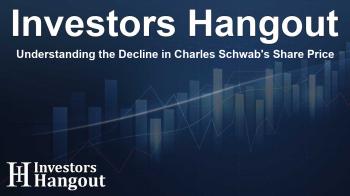Understanding the Decline in Charles Schwab's Share Price

Charles Schwab Corporation's Recent Stock Movement
Charles Schwab Corporation Common Stock (NYSE: SCHW) has seen a significant decline, particularly this past week. This drop is part of a larger trend affecting the financial sector, primarily driven by recent economic reports that have raised concerns about growth. Investors are cautious as signs of economic weakening become more prominent.
Key Economic Indicators Impacting SCHW Stock
The recent employment data revealed a troubling picture, where the U.S. economy reported a mere addition of 22,000 jobs. This figure is starkly below the estimates predicted by economists and marks a considerable slowdown compared to previous months. Such a report has led to mounting expectations that the Federal Reserve may need to cut interest rates to stimulate the economy in the upcoming meeting.
The Influence of Interest Rates on Financial Stocks
While lower interest rates might sound appealing, they can pose challenges for financial institutions like Charles Schwab. Lower rates generally compress net interest margins, the key earner for banks, impacting their profitability. This unique economic dynamic means that while consumers may benefit from lower borrowing costs, banks' earnings may suffer, causing stock prices to dip.
Market Reactions to Economic News
The immediate aftermath of the dismal job report saw a reaction in the bond market with Treasury yields falling sharply. This fall implies that market participants are increasingly betting on a rate cut by the Federal Reserve, creating additional pressure on banking and brokerage stocks. As these stocks are sensitive to interest rate fluctuations, investors are understandably wary.
Current Performance Metrics of SCHW Stock
As of the latest trading session, Charles Schwab shares were down 5.72%, closing at $92.05. Reflectively, this stock has fluctuated over the past year, reaching a high of $99.59 and a low of $61.16. These metrics signal the volatility of the stock and emphasize the reaction of investors to both internal and external economic factors.
Buying Charles Schwab Stock: Options and Strategies
If you’re interested in acquiring SCHW shares, there are numerous avenues to consider. Beyond simply purchasing shares directly from a brokerage platform, you can also invest indirectly through an exchange-traded fund (ETF) that includes Charles Schwab among its holdings. Such ETFs often consist of a diversified portfolio of financial stocks, helping you gain broader exposure to the sector.
Understanding Charles Schwab and the Financial Sector
Charles Schwab operates within the financial services sector, which is notably sensitive to economic fluctuations. By investing through an ETF, an investor can access a broad range of financial instruments and firms, providing a buffer against the inherent volatility of individual stocks.
Frequently Asked Questions
What caused the drop in SCHW stock price?
The decline in SCHW stock is largely attributed to a weak U.S. jobs report that raised concerns about economic growth and resulted in fears of potential interest rate cuts by the Federal Reserve.
How do interest rates affect financial stocks like Charles Schwab?
Lower interest rates can compress the net interest margins for financial firms, leading to reduced profitability and negatively impacting stock prices.
What are the current share price metrics for SCHW?
As per the latest data, Charles Schwab shares closed at $92.05, down 5.72%, with a 52-week high of $99.59 and a low of $61.16.
What are the options for investing in SCHW?
Investors can purchase SCHW shares directly or consider ETFs that include Charles Schwab, allowing for broader market exposure and risk diversification.
Why are financial sector stocks volatile?
The financial sector is impacted by macroeconomic factors such as interest rates, employment data, and overall market sentiment, leading to higher volatility in stock prices.
About The Author
Contact Dylan Bailey privately here. Or send an email with ATTN: Dylan Bailey as the subject to contact@investorshangout.com.
About Investors Hangout
Investors Hangout is a leading online stock forum for financial discussion and learning, offering a wide range of free tools and resources. It draws in traders of all levels, who exchange market knowledge, investigate trading tactics, and keep an eye on industry developments in real time. Featuring financial articles, stock message boards, quotes, charts, company profiles, and live news updates. Through cooperative learning and a wealth of informational resources, it helps users from novices creating their first portfolios to experts honing their techniques. Join Investors Hangout today: https://investorshangout.com/
The content of this article is based on factual, publicly available information and does not represent legal, financial, or investment advice. Investors Hangout does not offer financial advice, and the author is not a licensed financial advisor. Consult a qualified advisor before making any financial or investment decisions based on this article. This article should not be considered advice to purchase, sell, or hold any securities or other investments. If any of the material provided here is inaccurate, please contact us for corrections.

